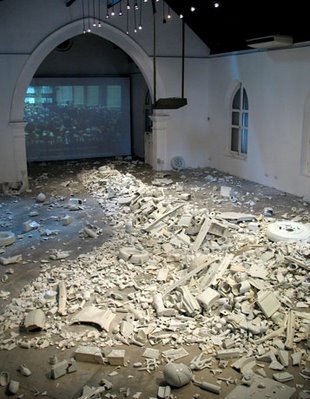Singapore Biennale 2006

BELIEF - If today's world has painfully called into question many certainties governing society, history and humankind, can it also be described as an era of uncertainty in which the very subject of belief is in question? In the context of this so-called crisis of values, what do we individually and collectively believe in? Do we act on our beliefs or is belief simply a mindless act? Are the religious beliefs communicated by the great faiths more relevant than the secular beliefs in science, progress, democracy and politics that succeeded them? Or has the conflict between the two spawned such states of violent and ethical extremism in the service of religious and economic power that belief in anything appears incomprehensible? Are we beyond belief or at the threshold of its revival?
Visited various biennale venues today including Sculpture Square where Liu Jianhua's Dream was exhibited. This, along with Bigert and Bergström's The Last Supper at the National Museum and YKON’s M8 at City Hall are my personal favorites.
DREAM: Mixed media installation in which an assemblage of smashed ceramic pop objects (a reference to China’s growing consumerism) in the shape of a space shuttle is complemented by a screening of a video on the Space Shuttle Challenger accident. This work is very much a grand, solemn and cathartic examination of human folly and ambition.

THE LAST SUPPER: Video installation of 58 minutes whereby the macabre and still enduring tradition of giving condemned death row inmates a final meal of their choosing the night before execution is investigated. Turning real life into the surreal, Bigert and Bergström’s work poignantly and potently used banally imparted fact to force the weighing of one of the most fundamental philosophical and ethical questions of our time, the state’s right to murder. 
M8 – Summit of Micronations, Singapore: The Exhibition Short Guild politely describes this mixed media installation as exploring 'Singapore as a conference, a forum, a meeting place where utopias are generated.' In my opinion, even a casual perusal of this work surely confirms that it depicts Singapore as a bit of a joke. The work consists of a video screening of the Summit of Micronations proceedings (eight people seated around an octagonal table laughing uproariously for the entire duration), the set of the above-mentioned video which groups Singapore with entities of questionable sovereignty like the Principality of Sealand and the Kingdoms of Elgaland & Vargaland and a little red M8 booklet.

M8 – Summit of Micronations, Singapore: The Exhibition Short Guild politely describes this mixed media installation as exploring 'Singapore as a conference, a forum, a meeting place where utopias are generated.' In my opinion, even a casual perusal of this work surely confirms that it depicts Singapore as a bit of a joke. The work consists of a video screening of the Summit of Micronations proceedings (eight people seated around an octagonal table laughing uproariously for the entire duration), the set of the above-mentioned video which groups Singapore with entities of questionable sovereignty like the Principality of Sealand and the Kingdoms of Elgaland & Vargaland and a little red M8 booklet.
 In the M8 booklet, the Singapore representative is described as:
In the M8 booklet, the Singapore representative is described as:
Lim Kong Soon (76)
Retired Politician, Republic of Singapore
Lim Kong Soon (LKS) is the founding father of post-war Singapore. Although retired from day-to-day politics, he is still driven by his great aspiration: to foster the stability and prosperity of "his child" - the city-state of Singapore. LKS has set up the Mini Summit of Micronations - M8 - to push forward the futuristic makeover of the small island state. Micronations might, after all, offer a shift of perspective - an evolutionary leap - or if nothing else, the possibility to grasp the present as history - something that can only be achieved when the present is transformed into a distant past by a future perspective. Lim Kong Soon strongly believes in progressivism (constant human progress - there are always things to improve), elitism (the world is a social pyramid in which members of an elite rule by virtue of their superior talent), geneticism (talent and intelligence are inherited and can be improved by eugenics) and cultural evolutionism (culture is a transient and ephemeral entity - a tool to be wielded from above by a progressive elite). While these four beliefs are so embedded in his thinking that one could call them faith, LKS is ready to abandon any other idea or system in exchange for new ideas as long as they promise improvement towards his Confucian ideal. He praises air-conditioning as the ultimate invention which brought control, comfort, and prosperity to South-East Asia. The air-conditioner provides a suitable metaphor for LKS's vision of society.
 swiss made. sturdy and in tip-top condition. dark and handsome. i'm an antique clock sitting on an antique table top in a dilapidated antique shop owned by mr. babuuna banana.
swiss made. sturdy and in tip-top condition. dark and handsome. i'm an antique clock sitting on an antique table top in a dilapidated antique shop owned by mr. babuuna banana.
